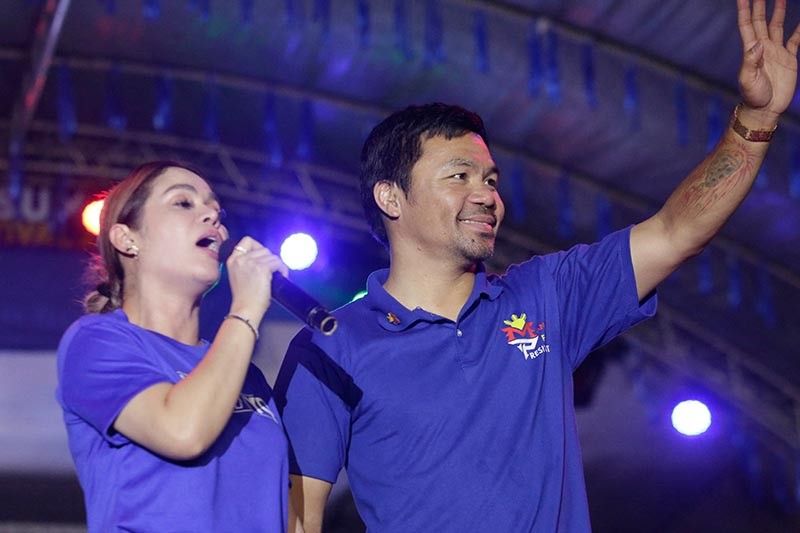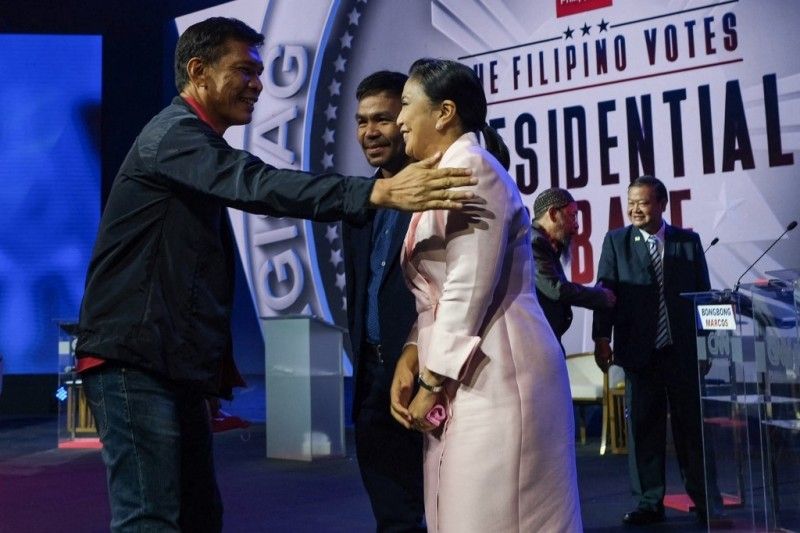Pacquiao spars with questions on competence in 'sincere' fight for country

MANILA, Philippines — When he launched the biggest fight of his life in the farming and fishing city of General Santos in February, Manny Pacquiao presented himself as the champion of the poor.
He was, after all, the poor boy who left his hometown in search of a better life and took on several jobs — among them in construction — to make ends meet before he went on to become a boxing great and a billionaire.
"Sisiguraduhin ko ang bawat Pilipino ay may trabaho at hinahanap ng trabaho. At sisiguraduhin ko sa inyo na walang mahirap na inaagrabyado at inaapi," he told his supporters at his hometown’s Oval Plaza on February 8.
(I will make sure that every Filipino has a job and that jobs will look for them. I will ensure that the poor are not aggrieved and oppressed.)
Despite low ratings in opinion polls, the PROMDI standard-bearer said he is the best person to succeed President Rodrigo Duterte at the helm of power because of his impoverished roots. He believes the poor and the ordinary folk will deliver the votes needed to win the presidency.
"Hindi ako nakatingin sa survey ngayon. Ang focus ko ay iyong mga taong maaabot ko, iyong mga mahihirap. Iyong nasa D-E class," Pacquiao said in April.
(I am not looking at surveys. I am focused on reaching people, the poor, those in the D and E classes.)
In the last 90 days, he wooed voters across the archipelago by vowing to give the poor free housing, raise the minimum wage of workers, and equalize salaries across all regions.
His "Health of the Nation" platform—a 22-point plan—also promised free education, support for fisherfolk and farmers, improved transportation systems, and more tertiary-level hospitals.
Fight vs corruption
For Pacquiao, corruption is the reason why many Filipinos remain poor. So he made knocking out corruption in government a centerpiece of his campaign.
If elected president, he said he will build a "mega prison" for corrupt public officials and recover ill-gotten wealth from the Marcoses and their cronies.
The eight-division world champion also threw punches at survey frontrunner Ferdinand “Bongbong” Marcos Jr. several times during the campaign. In March, Pacquiao challenged Marcos to a one-on-one debate as he stressed that the public cannot expect accountability from people who shun debates and forums.
He then called on the Marcos clan to pay their P203-billion estate tax liability as “no one is above the law.”
When the PDP-Laban faction led by Energy chief Alfonso Cusi endorsed the presidential bid of Marcos, Pacquiao pointed out the party was established to stand against the regime of Marcos’ late dictator father. In July 2021, the Cusi-wing expelled Pacquiao from the ruling party.
Divine intervention and improved numbers
Pacquiao was supposed to attend the Easter Sunday joint press conference of fellow survey laggards, which was expected to make a call for unity.
But it was a good thing he didn’t because the event turned out to be disastrous after Manila Mayor Francisco “Isko Moreno” Domagoso called on Vice President Leni Robredo—a distant second in pre-election surveys—to withdraw. After the faux pas, Domagoso’s preference rating nose-dived, and his campaign dealt with defections and resignations.

Pacquiao, who is deeply religious, attributed his missing the press conference to divine intervention. “If you are guided by God, God will find a way to protect you.”
He also rejected Domagoso’s call for the lone woman to quit the presidential race.
Pacquiao rose to third place in the latest survey of Pulse Asia, with 7%, overtaking Domagoso. Political analyst Jean Franco said the incumbent senator’s sincerity and consistency helped him improve his numbers, although he is well behind Marcos, who is leading with 56%.
Despite the odds, his camp said Pacquiao is the dark horse in the presidential race, and may still pull off a come-from-behind win.
Unproven competence
In January, Robredo said she would vote for Pacquiao if she were not running for president herself. "Kilala ko siya at alam ko na napaka-sinsero niyang tao (I know him and he’s a very sincere person),"
But Pacquiao’s "unremarkable" track record as legislator is a “huge red flag” for voters, said Michael Yusingco, a senior research fellow at the Ateneo School of Government.
"They know his heart is in the right place, but he has not proven himself as a public official. For most voters it would be very difficult to envision him as president without any tangible proof to hold on to. And I think this handicap hounded his campaign significantly," Yusingco told Philstar.com.
"It did not help that during the debates, he was too reliant on general or motherhood statements in explaining his plans and proposals… In the end, his popularity was simply not enough to help a big [chunk] of the electorate to see him as a viable president," he added.
‘Revolution of the poor’
In a recorded message played at Pacquiao’s last political rally in General Santos City, his running mate Rep. Lito Atienza (Buhay Partylist) stressed the need for a "genuine change" in Philippine politics. Atienza, a former Manila mayor and environment chief, was unable to campaign in person because of a knee injury.
He appealed to voter to elect a "pro-poor" president.
Since February, Pacquiao has repeatedly denied speculations that he will quit the presidential race. On the last day of political campaigning, the fighter—both in boxing and politics— called on Filipinos, for the last time, to join him in a revolution against poverty.
"Laban ito ng mga mahihirap na gustong umangat sa buhay, gustong magkaroon ng opportunity at trabaho."
(This is the fight of the poor who wish to have better lives, those who want to have opportunities and jobs.)
- Latest
- Trending
































